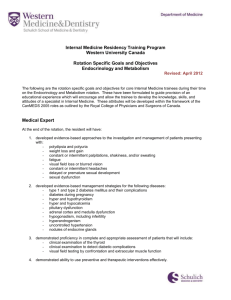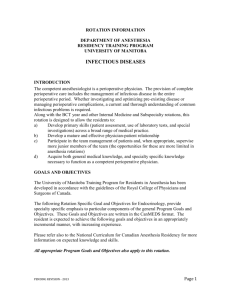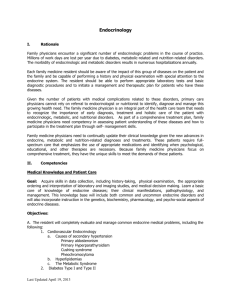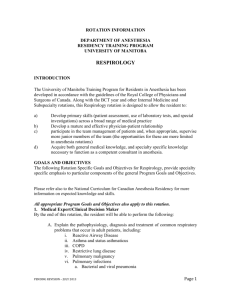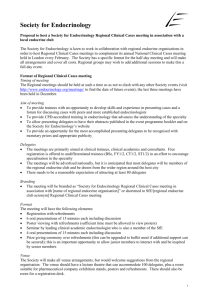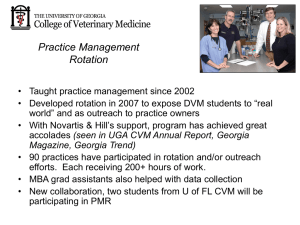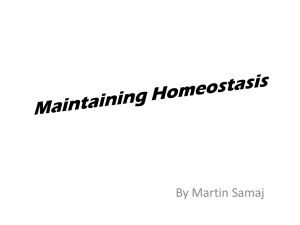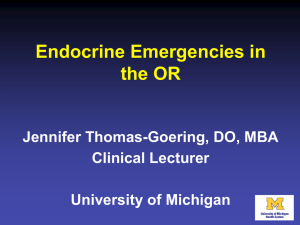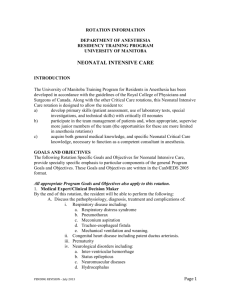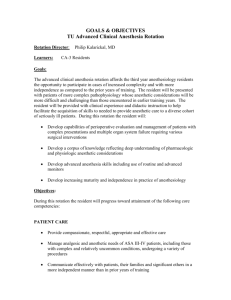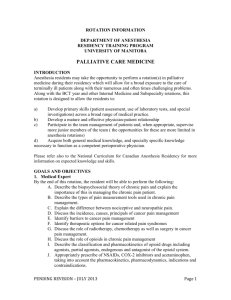Endocrinology - University of Manitoba
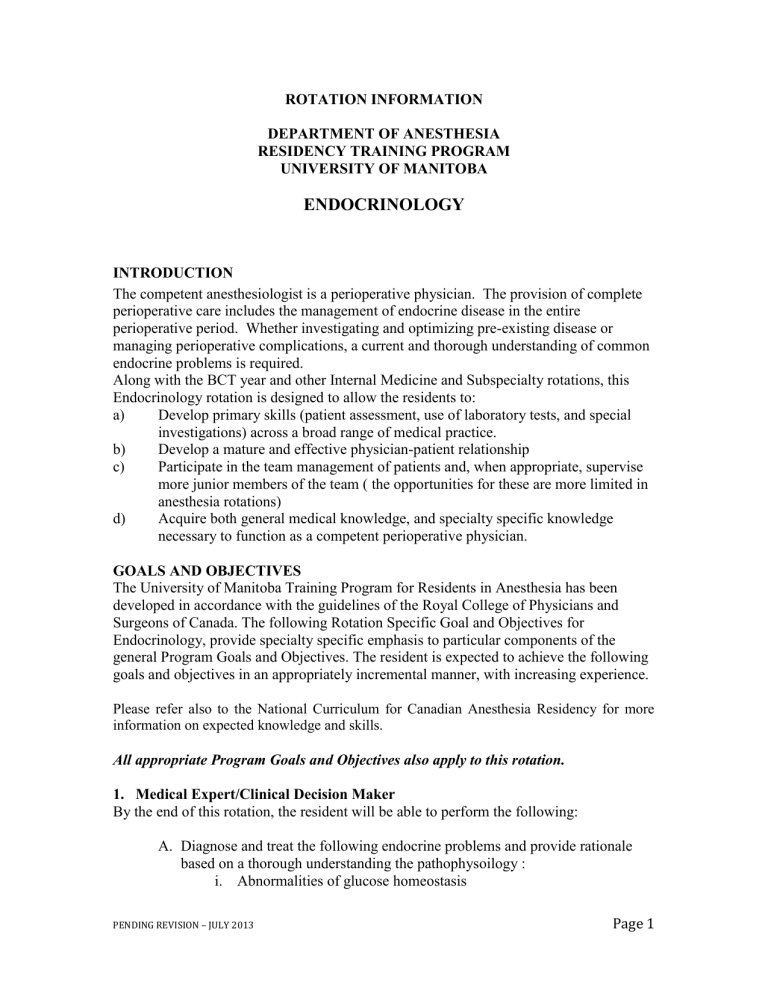
ROTATION INFORMATION
DEPARTMENT OF ANESTHESIA
RESIDENCY TRAINING PROGRAM
UNIVERSITY OF MANITOBA
ENDOCRINOLOGY
INTRODUCTION
The competent anesthesiologist is a perioperative physician. The provision of complete perioperative care includes the management of endocrine disease in the entire perioperative period. Whether investigating and optimizing pre-existing disease or managing perioperative complications, a current and thorough understanding of common endocrine problems is required.
Along with the BCT year and other Internal Medicine and Subspecialty rotations, this
Endocrinology rotation is designed to allow the residents to: a) Develop primary skills (patient assessment, use of laboratory tests, and special investigations) across a broad range of medical practice. b) Develop a mature and effective physician-patient relationship c) Participate in the team management of patients and, when appropriate, supervise more junior members of the team ( the opportunities for these are more limited in anesthesia rotations) d) Acquire both general medical knowledge, and specialty specific knowledge necessary to function as a competent perioperative physician.
GOALS AND OBJECTIVES
The University of Manitoba Training Program for Residents in Anesthesia has been developed in accordance with the guidelines of the Royal College of Physicians and
Surgeons of Canada. The following Rotation Specific Goal and Objectives for
Endocrinology, provide specialty specific emphasis to particular components of the general Program Goals and Objectives. The resident is expected to achieve the following goals and objectives in an appropriately incremental manner, with increasing experience.
Please refer also to the National Curriculum for Canadian Anesthesia Residency for more information on expected knowledge and skills.
All appropriate Program Goals and Objectives also apply to this rotation.
1.
Medical Expert/Clinical Decision Maker
By the end of this rotation, the resident will be able to perform the following:
A.
Diagnose and treat the following endocrine problems and provide rationale based on a thorough understanding the pathophysoilogy : i.
Abnormalities of glucose homeostasis
PENDING REVISION – JULY 2013
Page 1
a.
Diabetes mellitus b.
Hypoglycemia c.
Stress response and catabolism ii.
Adrenal hyper and hypofunction iii.
Pituitary and hypothalamic hyper and hypofunction iv.
Thyroid and Parathyroid hyper and hypofunction v.
Diabetes insipidus, SIADH vi.
Pheochromocytoma, Carcinoid syndrome vii.
Abnormalities Calcium, phosphate, and magnesium homeostasis
B.
Formulate and implement an appropriate plan for patient management based on understanding of the endocrine problem, coexisting problems, and patient factors such as anxiety, discomfort, culture, language, ethnicity, age, and gender
C.
Assess, manage, and optimize patients with the above endocrine diseases presenting for surgery.
D.
Apply an organized method of physical and laboratory assessment of patients with endocrine disease and communicate a succinct evaluation and management plan to Attending Staff.
E.
Discuss the indications, management principles, and complications of commonly used treatment including drugs (and their pharmacology) and hormones.
F.
Diagnose and manage potentially life-threatening problems such as i.
Severe hypotension with Addison’s disease ii.
Severe hypertension with pheochromocytoma iii.
Hypoglycemia with insulin excess iv.
Diabetic keto-acidosis
G.
Identify risk factors for the peri-operative development of endocrine dysfunction
2.
Communicator
By the end of this rotation, the resident will be able to perform the following:
A.
Establish a therapeutic relationship with endocrinology patients emphasizing understanding, trust, empathy, and confidentiality
B.
Elicit and synthesize relevant information from the patient and/or family, and be able to assess and take into account, the impact of a patient’s age, gender, ethnocultural background, social supports, and emotional influences on endocrine illness.
C.
Discuss appropriate information with the patient, his/her family, and other healthcare providers (endocrinologists, other physician requesting consultation, nursing staff, and other health professionals) to facilitate the optimal management plan for the care of the patient
3.
Collaborator
By the end of this rotation, the resident will be able to perform the following:
PENDING REVISION – JULY 2013
Page 2
A.
Effectively consult with other physicians and health care professionals and demonstrate appropriate judgment regarding the assessment of endocrine disease
B.
Coordinate the care of endocrinology patients with other members of the care team, especially endocrinologists, consultation requesting physicians, and nurses, as well as staff in the intensive care unit, and wards
C.
Demonstrate skill in managing urgent and crisis situations such as severe hypotension, severe hypertension, hypoglycemia, and diabetic keto-acidosis as a team member or leader
D.
Communicate a succinct assessment and management plan to Attending Staff and to other physicians requesting consultation.
4.
Manager
By the end of this rotation, the resident will be able to perform the following:
A.
Manage time and assign priorities to result in: i.
Efficient use of time for patient assessment ii.
Changes in response to emergencies
B.
Demonstrate the ability to make judgments regarding the cost-effective use of medical resources such as drugs, or other therapeutic choices
5.
Health Advocate
By the end of this rotation, the resident will be able to perform the following:
A.
Recognize and explain the importance of broad health and societal issues with impact on the care of the patient with endocrine disease including: i.
Risk factors and demographics which contribute to the development of endocrine disease ii.
Lifestyle changes and programs which may aid in the prevention and treatment of endocrine disease iii.
Factors that identify high-risk patients iv.
Short-term and long-term programs for health maintenance v.
Demonstrate the ability to intervene on behalf of patients regarding their care and safety
6.
Scholar
By the end of this rotation, the resident will be able to perform the following:
A.
Develop, implement, and monitor a personal continuing education strategy
B.
Formulate questions for ingoing appraisal
C.
Search and critically appraise current endocrinology literature, and apply new knowledge based on appropriate evidence
D.
Demonstrate effective oral presentation of case reports, journal club, or rounds with sound synthesis of pertinent information
E.
Facilitate learning of patients, housestaff, students and other professionals
PENDING REVISION – JULY 2013
Page 3
7.
Professional
Throughout this rotation, the resident shall:
A.
Deliver highest quality care with integrity, honesty, and compassion
B.
Demonstrate appropriate interpersonal and professional behavior
C.
Practice medicine ethically consistent with the obligations of a physician
D.
Be aware of the ethical and legal aspects of patient care
E.
Show recognition of personal limits through appropriate consultation (with staff supervisors, other physicians, and other health professionals) and show appropriate respect for those consulted
F.
Demonstrate including the patient in discussions of care management
G.
Recognize potential conflict in patient care situations, professional relationships, and value systems, and demonstrate the ability to discuss and resolve differences of opinion. Additionally, be able to accept constructive feedback and criticism and implement appropriate advice.
PENDING REVISION – JULY 2013
Page 4
